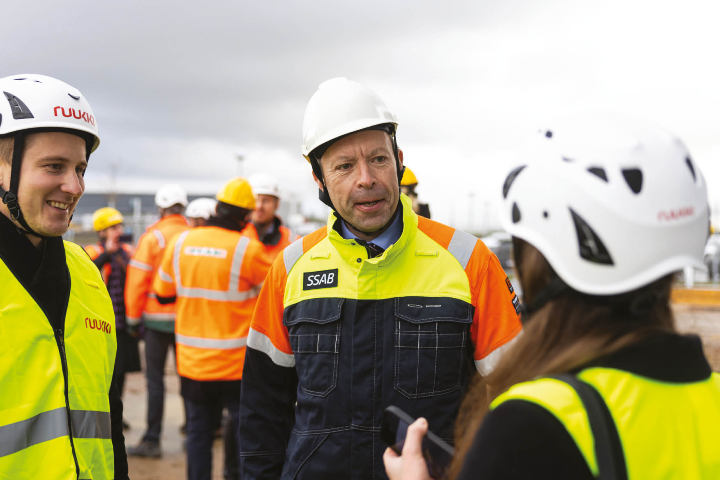
Volvo CE - laying the groundwork for sustainable urban construction
04 April 2025
In a pioneering effort to reduce emissions and transform the construction industry, SCC UK Patron Volvo Construction Equipment (Volvo CE) is spearheading a collaboration in London. The project introduces a UK-first solution for electrifying urban construction worksites with the use of a mobile powering source. By teaming up with key partners – including London-based startup Charge Fairy, Transport for London (TfL), and FM Conway – Volvo CE is playing a central role in addressing the barriers to electric construction machinery.
The initiative began with a clear goal: reduce emissions from urban construction worksites. Volvo CE’s fleet of electrified vehicles makes this possible. “Everyone can deliver a hole in the ground, but making it sustainable, for both people and environment, is another question,” says Mats Bredborg, Electrification Leader at Volvo CE.
One central challenge with urban electric construction sites needed to be addressed – reliable access to charging power. “We wanted to find a solution to a very specific problem,” says Mats. “The biggest issue on electrifying urban sites is having access to reliable power for electric construction equipment. It’s not just about having charging points around the city but having access to power on-site when you need it.”
Volvo CE partnered up with London-based startup Charge Fairy to develop an innovative mobile charging solution for construction sites. Adapting an ‘on-demand’ charging van concept typically used for passenger cars, the system delivers power directly to machinery, meaning it will no longer need to leave the site for recharging. This approach addresses a crucial challenge in electric construction – limited charging infrastructure in urban environments – while improving uptime and operational efficiency.
“Construction machinery often has to move off-site to charge, resulting in wasted time and reduced productivity,” Mats explains. “This new solution allows us to bring the power directly to the machines, ensuring that construction projects can continue without interruption.”
A groundbreaking trial in central London
The mobile charging van is currently being tested in a first of its kind trial in London at Redcliffe Gardens, a site managed by FM Conway and supported by TfL. The trial features Volvo CE’s electric machinery, including the EC18 Electric compact excavator and the L25 Electric compact wheel loader. These machines are already in use on several locations within the Royal Borough of Kensington and Chelsea, proving that the technology is ready to deliver real-world benefits today, not in some distant future.
Teamwork towards sustainability
The success of this trial is the result of a true collaboration between diverse yet like-minded partners. Volvo CE, committed to achieving net zero greenhouse gas emissions across its value chain by 2040, has been instrumental in bringing together key players from various sectors, including public transportation, construction, and cleantech innovation. By pooling resources and expertise, these partners are demonstrating how collaboration can address complex urban challenges and do the groundwork for a more sustainable future – with a Swedish solution at is core.
“This project is an example of how we can come together to solve shared problems,” Mats claims. “Someone clever once said that partnership is the new leadership. And nobody in the value chain can do this by themselves. Each partner brings unique insights, but we all share a common goal: to make urban construction more sustainable and less harmful to the environment.”
Addressing emissions and improving urban air quality
A major benefit of transitioning to electric-powered construction equipment is the reduction of harmful emissions like nitrogen oxides (NOx) and particulate matter (PM). In cities like London, where construction vehicles are often a significant source of pollution, electric machinery offers an effective solution to improve air quality. The use of electric vehicles removes tailpipe emissions, making a distinct difference in reducing the environmental impact of construction sites.
In fact, diesel compact construction machinery, which is responsible for a great portion of construction emissions, contributes disproportionately to urban air pollution. The adoption of electric alternatives would have a significant impact, potentially eliminating the harmful NOx and PM pollutants from thousands of compact machines operating in London. This would be equivalent to removing 100.000 diesel passenger cars from the roads of London, each year.
Reaching net zero: a vital step for London
The trial at Redcliffe Gardens aligns with TfL’s ambitious goal to reach net-zero carbon emissions by 2030. For Carl Eddleston, TfL’s Director of Network Management and Resilience, this project plays an important role in achieving that target.
The health of everybody in London is central to our work, and we are determined to meet our 2030 net zero targets,” Carl says. “The trial of electric construction vehicles at Redcliffe Gardens is such a vital part of achieving our goals, and our work with FM Conway, Volvo CE, and Charge Fairy shows how construction across our transport network can be environmentally conscious.”
Intelligent energy delivery and real-time charging
One of the most exciting aspects of the mobile charging solution is its real-time updates, which allow construction machines to be charged exactly when and where needed. This system not only simplifies operations but also improves efficiency, ensuring that the machines are fully charged and ready to work without interruption.
“We’ve long advocated that bringing energy to electric vehicles can make more sense than taking the vehicle to a charger – nowhere is this more true than with construction equipment,” explains Ed Lea, founder of Charge Fairy and notes that the trial has “demonstrated how intelligent energy delivery enables electric plant to operate for a full workday, overcoming one of the key challenges of construction electrification.”
Supporting the shift to electric construction
The partnership between Volvo CE, Charge Fairy, TfL, and FM Conway is proof of a collective commitment to achieving a sustainable, low-emission future for urban construction. With the ongoing success of the trial, it’s clear that mobile charging could play a key role in overcoming the traditional barriers to electric construction equipment. For FM Conway, this bespoke charging solution represents a practical and effective way to move closer to net-zero emissions, making electric machinery a viable option for similar sites in the future.
“This bespoke charging solution removes many of the barriers we have faced in the use of electric plant machinery, and we've seen from the works on Redcliffe Gardens that it represents a viable option for similar sites in the future,” says Matt Tallon, Sustainability Director at FM Conway.
A greener, healthier future for urban environments
The potential for electric construction equipment to reduce urban pollution is immense. In London, where compact diesel machinery emits harmful pollutants, the transition to electric alternatives could drastically improve public health by reducing air contamination. “Electric construction equipment is part of the solution to cleaning up our urban environments,” Mats claims. “We’re working together to create a future where construction is no longer a source of pollution, but a force for positive change.”
A promising path forward
Looking ahead, the success of this trial has the potential to inspire similar initiatives across the UK and beyond. As Mats concludes, “The technology we’re using today is already proven and operational. It’s not about waiting for the future – it’s about embracing what’s possible now and using it to transform how we build our cities.”



